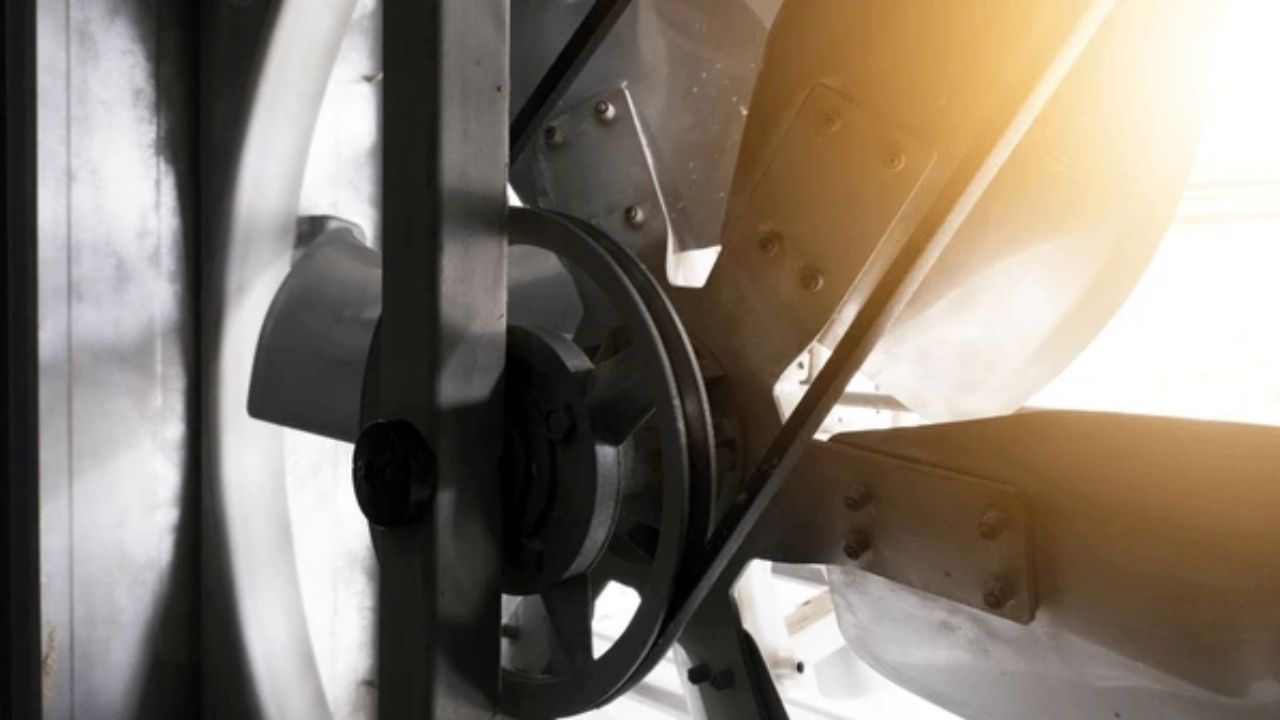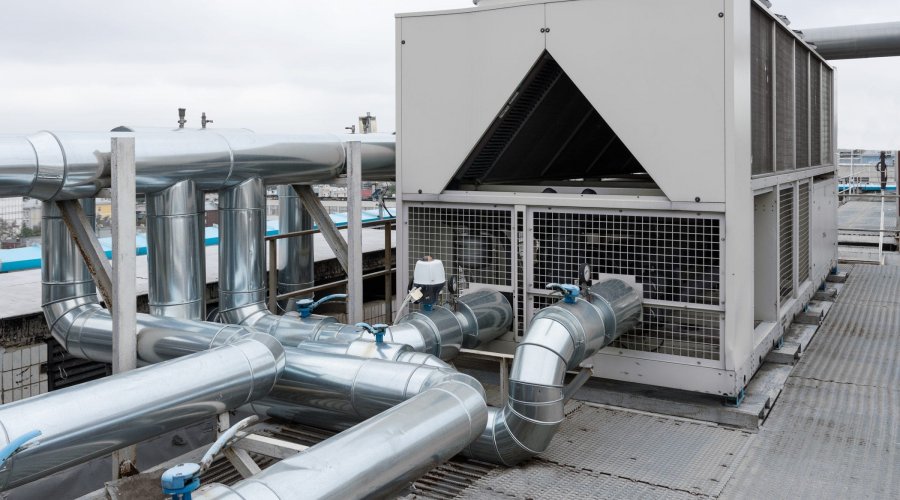
Axial Fan Types Performance and Application Areas


The main components of industrial process cooling systems consist of various parts that are brought together to provide an effective cooling process. These components include a refrigerant (usually a refrigerant gas or liquid), a compressor, a condenser, an expansion valve, and an evaporator. While the refrigerant absorbs and transports heat, the compressor compresses the refrigerant, increasing its temperature. The condenser then cools the compressed refrigerant, condensing it and turning it into liquid. The expansion valve expands the refrigerant, reducing its pressure and allowing it to enter the evaporator. The evaporator lowers the temperature in the process by absorbing the heat of the refrigerant and cooling it. When these components come together, industrial process cooling systems operate efficiently and provide the desired temperature range.
The major components of industrial process cooling systems come together to ensure the systems operate effectively. These components include a chiller, a compressor, a condenser, an expansion valve, and an evaporator. While the refrigerant absorbs and transports heat, the compressor compresses the refrigerant, increasing its temperature. The condenser then cools the compressed refrigerant, condensing it and turning it into liquid. The expansion valve expands the refrigerant, reducing its pressure and allowing it to enter the evaporator. The evaporator lowers the temperature in the process by absorbing the heat of the refrigerant and cooling it. With the combination of these components, industrial process cooling systems operate reliably and effectively, providing the desired temperature level in the process.

Industrial process cooling is considered a critical means of improving manufacturing efficiency. These systems keep the heat generated during the process under control, ensuring that the equipment operates at optimum temperature. As a result, overheating of machinery and equipment is prevented and process processes become more stable. Additionally, industrial process cooling systems can improve the quality of products. For example, in the metal processing industry, the cooling process reduces the temperature generated during the shaping of metal parts, increasing process efficiency and also improving the surface quality of machined parts. Therefore, industrial process cooling systems increase the efficiency of manufacturing businesses, making production processes more competitive.
Industrial process cooling is considered a critical means of improving manufacturing efficiency. These systems keep the heat generated during the process under control, ensuring that the equipment operates at optimum temperature. As a result, overheating of machinery and equipment is prevented and process processes become more stable. Additionally, industrial process cooling systems can improve the quality of products. For example, in the plastic injection molding process, the cooling system speeds up production processes by reducing mold cooling time and also increases the dimensional stability of molded parts. In this way, industrial process cooling systems increase the competitiveness of manufacturing enterprises and maximize production efficiency.
Industrial process cooling is critical in many industries and plays an indispensable role in supporting the operations of these industries. In particular, the metalworking industry is highly dependent on industrial process cooling systems. Cooling systems are used to control high temperatures that occur during operations such as metal cutting, drilling, grinding and welding. Similarly, the plastic and rubber industries also rely on industrial process cooling systems. These systems must be used for proper cooling and hardening of materials during processes such as plastic injection molding, extrusion and casting. The food industry is also heavily dependent on industrial process cooling systems. Maintaining appropriate temperature conditions during the processing, storage and transportation of food products is vital, requiring the use of industrial process refrigeration systems.
Many industries rely on industrial process cooling systems to maintain their operations and ensure product quality. In particular, the chemical industry uses these systems to control the high temperatures that occur during reactions. Stable temperature conditions in chemical processes ensure the quality of the products and the homogeneity of the ingredients. Additionally, the power generation industry also has a significant dependence on industrial process cooling systems. Power plants cool equipment such as turbines and generators using industrial cooling systems, increasing efficiency and reducing wear. Likewise, the pharmaceutical industry requires industrial process cooling systems because temperature control is critical in delicate manufacturing processes. These industries all rely on industrial process cooling systems to ensure the safety, efficiency and quality of their processes.
Industrial process cooling technologies offer a variety of options, which vary depending on the needs and applications of businesses. Primarily, water cooling systems are a common option for industrial process cooling. In these systems, water removes heat from the process equipment and is cooled by a cooling tower or chiller, then circulated for reuse. Air cooling systems are preferred to reduce water usage. In these systems, air is passed around the equipment via a fan and carries away heat. Another option, coolants, are especially ideal for low-temperature applications. Cooling liquids are preferred when water cannot be used or is not suitable and are generally used with special cooling systems.
Industrial process cooling technologies offer a variety of options, which vary depending on the needs and applications of businesses. Water cooling systems are a common option for industrial process cooling. In these systems, water removes heat from the process equipment and is cooled by a cooling tower or chiller, then circulated for reuse. Air cooling systems are preferred to reduce water usage. In these systems, air is passed around the equipment via a fan and carries away heat. Another option, coolants, are especially ideal for low-temperature applications. Cooling liquids are preferred when water cannot be used or is not suitable and are generally used with special cooling systems. These different technologies provide a variety of options to meet industrial process cooling needs.
Industrial process cooling systems use a variety of methods to maintain optimal temperature levels. These systems continuously monitor the temperature levels of process equipment, often through thermal sensors and control systems. When the temperature of the equipment rises above the specified limits, the cooling systems are automatically activated and the cooling process begins. Cooling is usually achieved through water or coolants. For example, using a chiller, heat is removed from process equipment and cooled, then recycled to maintain the desired temperature level. This process ensures that industrial process cooling systems precisely and consistently maintain optimal temperature levels.
Industrial process cooling systems use a variety of methods to maintain optimal temperature levels. These systems continuously monitor the temperature levels of process equipment, often through thermal sensors and control systems. When the temperature of the equipment rises above the specified limits, the cooling systems are automatically activated and the cooling process begins. Cooling is usually achieved through water or coolants. For example, using a chiller, heat is removed from process equipment and cooled, then recycled to maintain the desired temperature level. This process ensures that industrial process cooling systems precisely and consistently maintain optimal temperature levels.
Businesses must consider a number of factors when choosing industrial process cooling solutions. First, it is important for businesses to understand their current processing requirements and practices. Each industry may have different cooling needs, so businesses need to evaluate factors such as process temperature requirements, cooling capacity and continuous operating conditions. Secondly, it is important for businesses to consider their budget and resources. Industrial process cooling systems can be costly to invest in, so it is important for businesses to choose an appropriate solution by taking their long-term budget and financial planning into account. Additionally, energy efficiency should also be considered because energy costs can form a significant part of operating expenses. Finally, it is important for businesses to choose a solution that suits their existing facilities and infrastructure. The installation and integration of industrial process cooling systems must match the structure and requirements of existing facilities, so it is important to select the appropriate equipment.
Businesses must consider a number of factors when choosing industrial process cooling solutions. First, it is important for businesses to understand their current processing requirements and practices. Each industry may have different cooling needs, so businesses need to evaluate factors such as process temperature requirements, cooling capacity and continuous operating conditions. Secondly, it is important for businesses to consider their budget and resources. Industrial process cooling systems can be costly to invest in, so it is important for businesses to choose an appropriate solution by taking their long-term budget and financial planning into account. Additionally, energy efficiency should also be considered because energy costs can form a significant part of operating expenses. Finally, it is important for businesses to choose a solution that suits their existing facilities and infrastructure. The installation and integration of industrial process cooling systems must match the structure and requirements of existing facilities, so it is important to select the appropriate equipment.

Fill out the form to discover the most suitable high-end products for your projects. Contact Us Now.